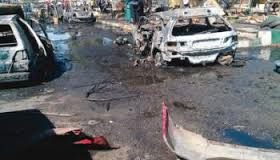Battling multiple bombers strapped with
suicide vests, Nigerian troops and civilian self-defense fighters on
Friday repelled the fiercest Boko Haram extremist attack in months on
the key northeastern city of Maiduguri. Nine bombers and two civilians
were killed, according to witnesses, soldiers and police.
The United Nations said the attackers targeted refugees in the city
that is the birthplace of the Islamic uprising and the headquarters of
the military campaign to halt it.
Friday’s targets were a site hosting more than 9,000 refugees and a
garage where some have gathered to get transportation home, Farhan
Haq, deputy spokesman for the U.N. secretary general, told reporters
in New York. “These are not the first attacks affecting the most
vulnerable people.”
Residents in Maiduguri awoke to mighty explosions around midnight.
Three female suicide bombers blew themselves up at a truck station,
detonating vehicles at Muna Garage on the city’s eastern outskirts,
according to police Deputy Superintendent Victor Iskukwu.
Two civilians died in the blasts and seven self-defense fighters were
wounded, witness Ayuba Ibrahim told The Associated Press.
“Most of the trucks that were loaded with goods for export to Chad and
the border communities were destroyed, along with commodities worth
millions of naira,” Ibrahim said.
One blast occurred as people were trying to board the trucks, said
resident Isa Mamman.
The attack also targeted a military checkpoint, according to Ahmed
Satomi of the Borno State Emergency Management Agency.
Soldiers later fired at gunmen on motorcycles escorting other suicide
bombers, killing at least six of the bombers.
The ambush shows “an increased boldness on the part of a rejuvenated
Boko Haram,” SBM Intelligence risk analysts said Friday, adding that
the extremists’ ranks have been bolstered by an “influx of hardened
fighters from the Sahel and Libya.”
A multinational force last year drove Boko Haram out of towns and
villages in northeast Nigeria, but attacks and suicide bombings
continue.
Boko Haram’s seven-year Islamic uprising has killed more than 20,000
people and driven 2.6 million from their homes, creating the worst
humanitarian crisis on the continent with millions facing starvation.
